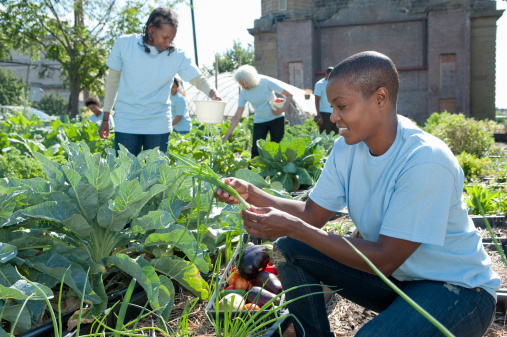
McQuirter also recommends visiting local veggie restaurants as often as budgets allow to get a feel for how vegetarian food is prepared and to be armed with ideas for meals out with friends.
Social connections may not be among the primary concerns of everyone interested in a plant-based diet, but for some, like me, fellowship with family and friends is a consideration — a considerable one. So much human bonding occurs over food, it seems to me that rejecting the Standard American Diet, while perhaps a healthier and more humane path, can also be isolating.
It is one thing to reckon with the loss of Auntie’s famous collard greens cooked with ham hocks, traditional New Year’s Day chitterlings, fried chicken and other dishes, based on animal products that are not only pleasurable for many people to eat, but are also enshrined in personal and cultural histories, but how can vegetarians and vegans ease the impact of their choices on loved ones, who may see rejection of animal products as a much deeper rejection of love … of family … of race and ethnicity? Or they may just find it weird. What about the damned ribbing? Girl, you know you want a piece of this chicken!
McQuirter’s mother and sister became vegan through their own exposure to Gregory and other thinkers on healthy eating. But most of the rest of her family, including another sister, remain meat eaters. And that is okay.
Those who eat plant-based diets can choose to arrive at gatherings post-meal for the socializing and togetherness. But vegetarians can also enjoy the fellowship of gatherings centered on food. McQuirter suggests bringing veggie versions of the foods on the menu. There are veggie versions of everything from ribs to chicken nuggets. (And making tasty meatless greens is criminally easy.)
“You can go to town, like my sister and my mother and I used to do when we first became vegan. We cooked all this food and brought it to family gatherings to impress our relatives and show them how good vegan food can be.
We did the vegan ambassador thing for a couple of Thanksgivings and then we just got tired of the teasing and tired of making all this food that no one was eating. We decided to just bring our food, fix our plates and come out and sit with everybody. We’re not going to talk about it. We’re not going to explain why we eat this way, other than, ‘Oh, I’m vegan now.’ We’re not going to respond to the teasing.
Eventually, our relatives stopped teasing. We stopped being self-righteous and pressed about it. This is our food. That’s your food. You don’t have to eat what I eat. I don’t have to eat what you eat. The end.”
McQuirter says it gets easier, but much of a peaceful social transition begins with “you.” “You have to be easy about it. At first, all you’re focused on is ‘I’m being different and people are going to call me out or ask questions or I’m going to be tempted. You just have to work through that.”
Knowledge is one key to an easy transition. The more you know about meat, how it comes to our plates and what animal products can do to our bodies, the less likely you are to succumb to temptation, McQuirter says–actually, the less likely you are to even be tempted. “You can sit at a table with folks eating fried chicken and not want it.”
But being smart about animal products doesn’t equal proselytizing. McQuirter stresses that there is no need to judge others or climb on a soapbox. Don’t be tiresome. “I never discuss food and nutrition at the table.”
Certain foods may provide “handles” to friends, family and culture, but new links can also be forged. I can reject the Standard American Diet and meat, without rejecting the things that are truly important to me.
Safran Foer writes:
“Our decisions about food are complicated by the fact that we don’t eat alone.
Some of my fondest memories are of weekly sushi dinners with my best friend; and eating my dad’s turkey burgers with mustard and grilled onions at backyard celebrations; and tasting the salty gefilte fish at my grandmother’s house every Passover. These occasions simply aren’t the same without those foods and that matters.
To give up the taste of sushi or roasted chicken is a loss that extends past giving up a pleasurable eating experience. Changing what we eat and letting tastes fade from memories create a kind of cultural loss … a forgetting. But perhaps this kind of forgetfulness is worth accepting — even worth cultivating.”
To me, a little loss is worth not succumbing to the diabetes and high blood pressure that are common in my family. It is worth it to me to not add to the destruction of the environment or the suffering of animals.
Safran Foer continues, “Recently my friend and I started eating veggie sushi and going to the Italian restaurant next door. Instead of the turkey burgers my dad grills, my children will remember me burning veggie burgers in the backyard. At our last Passover, gefilte fish held a less central place, but we did tell some stories about it.”




It very hard for folks to comprehend the issues with meat when everything is produced so far away. Nice article
What a great article. Tamara, I love to follow your journey towards health and wellness.